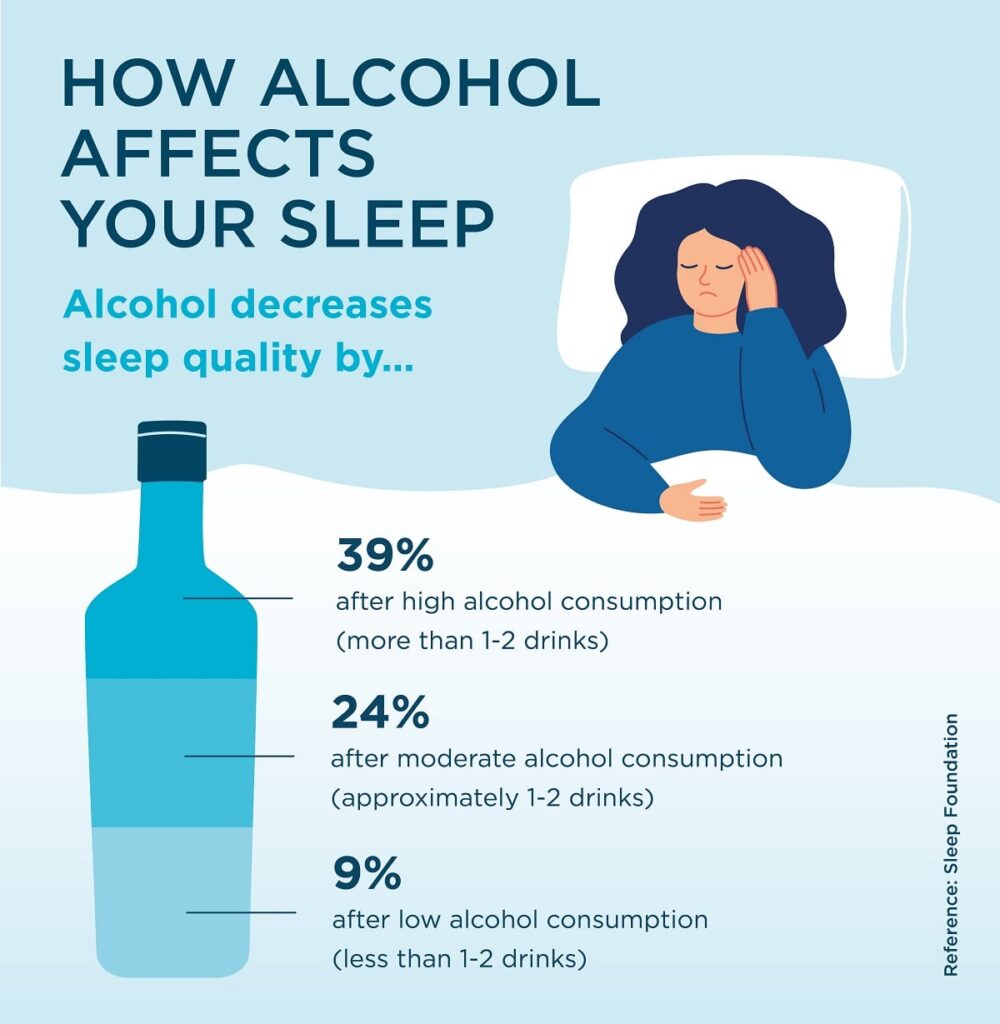Sleep is vital for our mental and physical well-being. It’s during sleep that our body goes into maintenance mode, repairing and rejuvenating itself. However, many people are unaware of the impact alcohol can have on their sleep. While it may help some individuals fall asleep faster, it can disrupt sleep patterns and prevent deep, restorative sleep. In this blog, we’ll explore the effects of alcohol on sleep and why cutting down on alcohol can lead to a more rested and refreshed waking experience.
The Myth about Alcohol and Sleep:
Many people believe that alcohol helps them sleep, as it can make them feel drowsy and aid in falling asleep more easily. But, believe it or not, alcohol is a prime culprit in disrupting your sleep. It hinders the body’s chemical processes required for restful slumber, particularly the crucial REM stage. By delaying this stage early on, alcohol forces the body to compensate later, affecting both memory formation and recall upon waking. As alcohol wears off, it disrupts our sleep cycles, resulting in fragmented and less restorative sleep. Trust us, your sleep will be better without alcohol!
The Impact on Sleep Quality:
Although alcohol can induce feelings of relaxation and sleepiness, the reality is that it only damages the quality of sleep. Alcohol acts as a diuretic, causing nighttime trips to the bathroom. It inhibits the release of vasopressin, a crucial chemical that regulates water balance. This excessive fluid loss leads to dehydration and can result in restless sleep or even an inability to fall asleep.
Additionally, alcohol can act as a stimulant, making insomnia more severe for some individuals. Drinking alcohol disturbs our brain rhythms and prevents us from achieving the deep sleep necessary for feeling rested and refreshed in the morning.
Even consuming one or two alcoholic beverages can negatively affect sleep quality. Exceeding the recommended weekly alcohol intake guidelines can contribute to excessive fatigue the following day. Here are some reasons why alcohol impairs sleep quality:
- Increased likelihood of waking up during the night to use the bathroom.
- Disruption of your circadian rhythm, or ‘body clock,’ which includes your natural sleep cycle.
- Reduced time spent in the deep sleep phase, known as rapid eye movement (REM) sleep, which is essential for restoration.
- Possibility of waking up with a hangover, leading to grogginess, headaches, and fatigue. (Surprising fact: Your brain lacks pain receptors, so that hangover headache you feel isn’t your brain hurting. Instead, the pain originates from the inner lining of the skull and blood vessels, giving the illusion of the brain pounding against the skull!)

The Link Between Alcohol and Insomnia:
Regular alcohol consumption can increase the risk of developing insomnia over time. Alcohol is a central nervous system depressant that initially slows down brain activity. However, as alcohol levels in the blood decrease a few hours later, it can have a stimulant or wake-up effect, disrupting sleep. People with alcohol use disorders commonly experience symptoms of insomnia.
Sleep Apnoea and Alcohol:
For individuals with sleep apnea, drinking alcohol can exacerbate the condition. Alcohol raises the arousal threshold, making it harder to wake up and adjust breathing if it becomes obstructed during sleep. It also relaxes the muscles around the airways, increasing the likelihood of breathing obstructions.
Tips for Improving Sleep After Drinking Alcohol:
While cutting down on alcohol is the best approach for better sleep, there are strategies you can employ to mitigate its effects:
- Eat a meal before drinking to help slow down alcohol absorption.
- Hydrate wisely: Drink water between alcoholic beverages to stay hydrated.
- Say no to caffeine: Avoid consuming caffeine, as it can further disrupt your sleep.
- Timing matters: Skip alcohol within two (ideally four) hours of bedtime, as even moderate amounts can disrupt sleep.
- Sip something soothing: Opt for a warm glass of milk or herbal tea instead of heavy meals, spicy food, or fizzy drinks before sleep.
- Stick to limits: Adhere to recommended alcohol limits (2–3 units for women, 3–4 for men) to ensure better sleep quality.
- Empty your bladder regularly before bed to reduce the need to wake up during the night.
- Create a sleep haven: Make your environment sleep-friendly by keeping it dark, cool, quiet, and free from gadgets. Make sure you have a good mattress, bedframe and pillows.
Get a good night’s sleep!
Cut back on the booze; don’t lose your snooze. We recommend tuning into your body. If you feel tired, prioritise alcohol-free sleep. Prioritise your sleep and make the necessary changes to create a healthier sleep routine.

